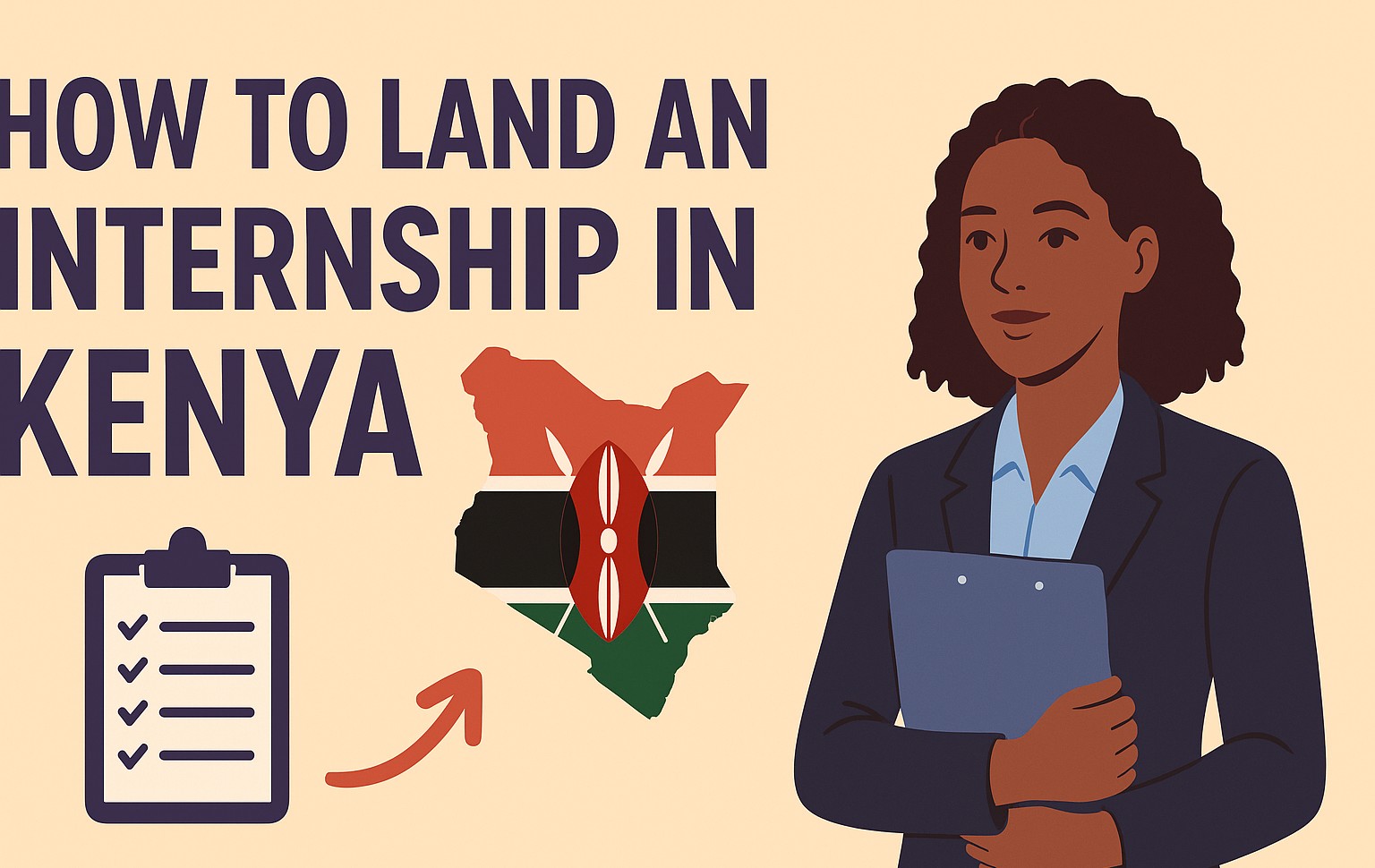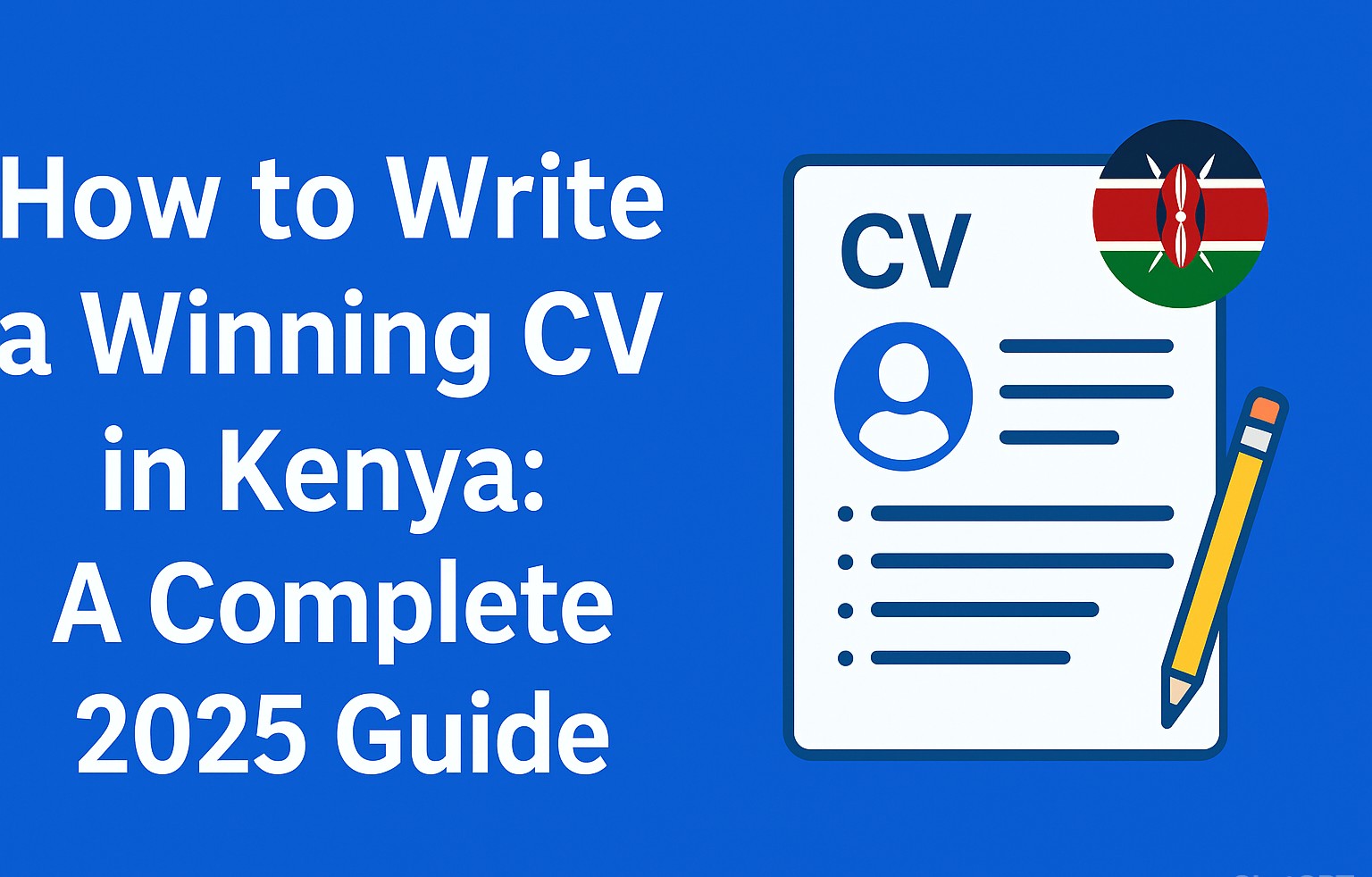

Titus Morebu
Author
How to Land an Internship in Kenya: A Step-by-Step Guide to Success 🚀
Discover the most effective strategies to secure internships in Kenya—eligibility, applications, channels, preparation, visa tips—and stand out in 2025.
Securing an internship in Kenya today is both exciting and competitive. Whether you’re a university student or recent graduate, internships can serve as your launchpad into the professional world. This guide walks you through current realities, best practices, and actionable steps to get an internship in Kenya in 2025 and beyond. 🌍
Why an Internship Matters
An internship gives you:
- Real-world experience to bridge the gap between theory and practice.
- Professional networks and references to boost your career.
- Hands-on skills and exposure to workplace culture.
- A stronger resume that makes you stand out to employers.
Understand the Kenyan Landscape
Public Sector Internship Programs
The Kenyan government runs internship initiatives aimed at youth employment and skills development. The **Public Service Internship Programme (PSIP)** places interns within ministries, agencies and public institutions. The program often includes a stipend and is typically open annually.
Also, many state agencies—such as the Kenya Revenue Authority (KRA)—advertise internship intakes during the year. Be ready when calls are out.
Private, NGO & International Opportunities
Large companies and NGOs also run structured internship or “attachment” programs. For example:
- Telecoms or tech firms often advertise summer internships or “intern & graduate” tracks.
- Research organizations like APHRC (African Population and Health Research Center) run research internships.
- NGOs, foundations, think tanks, consultancies, media houses and social enterprises may offer short-term internships or volunteer roles that can build your portfolio.
Stipends vs. Unpaid Internships
In Kenya, some internships are paid (stipends), many are not. Always ask whether a stipend or support (transport, meals) is provided. The primary value is the experience and connection — but financial support helps you sustain your time.
Eligibility & Legal Requirements
Who Qualifies?
- Often, you must be enrolled in or recently graduated from a recognized university or college program. Some government programs require graduation not older than a few years ago.
- You may need to meet minimum academic performance or show relevant coursework or skills.
- Some agencies impose age or year-of-graduation limits.
Visa & Pass Requirements (for foreign interns)
If you are not Kenyan, you may need a **Student/Internship pass** under Kenya’s immigration rules. This typically involves:
- Filling application forms (e.g. Form 30) with institution endorsement
- Submitting a detailed cover letter from your educational institution describing the internship
- Providing passport, academic credentials, CV, and other supporting documents
- In research-related roles, getting clearance from authorities like NACOSTI
Public Service Guidelines
Government internships follow set criteria and transparency rules, often guided by official guidelines on public service internship management. Your placement is usually competitive.
How to Find Internship Opportunities in Kenya
Use Official Portals & Platforms
- The Kenya Skills Hub or public service commission websites list internship openings across government agencies.
- Job boards like MyJobMag, corporate staffing sites, LinkedIn, and local career portals often list internship roles.
- Watch out for calls from institutions like Nairobi National Statistics Bureau, government ministries, or public agencies.
Target Specific Institutions & Organizations
Instead of waiting, proactively approach organizations you’re interested in. Use their career or HR section to look for “internship” or “graduate programmes.” Some examples:
- Large corporations in telecom, finance, tech or consulting
- Research institutes, policy think tanks, or academic centers
- Community organizations, startups or social enterprises
Leverage Your Networks
- Talk to professors, alumni, or people in your field for leads
- Use student associations, clubs, or societies to share calls
- Attend career fairs, networking events, or seminars
Internship Programs to Watch Out For
- World Vision Graduate Internship Programme (GRIP)
- Competition Authority of Kenya Internship Program
- Annual KRA internship intakes
- Organizations like FES Kenya
- Structured programs by large private firms (e.g. KPMG Kenya attachments)
How to Apply & Prepare to Be Selected
Crafting a Strong Application
- Write a tailored cover letter: reflect how your skills match the internship’s goals.
- Maintain a sharp, clean CV focusing on relevant coursework, projects, volunteer roles, leadership, skills.
- Get strong references — lecturers, mentors, past supervisors — who can speak to your work ethic.
- Include samples of your work (projects, writing, portfolios) if applicable.
Tips for Assessment & Interview Stage
- Prepare for assessments: some organizations test technical, logical reasoning, or domain knowledge.
- Show willingness to learn, adaptability, and initiative.
- Research the organization: mission, ongoing projects, values — link them to what you bring.
- Be punctual, dress appropriately, and follow up politely after interviews.
Negotiate Terms Respectfully
While interns often have limited leverage, you can ask about logistic support (transport, meals) or a small stipend. Be polite and professional in broaching these topics.
Maximizing Impact During Your Internship
Set Clear Goals & Expectations
At the onset, agree with your supervisor on tasks, deliverables and learning goals. This helps ensure you leave with achievements to highlight. 📌
Be Proactive & Seek Mentorship
- Volunteer for new tasks or projects.
- Ask questions when unsure and request feedback.
- Learn from experienced staff and try to shadow them.
Document & Reflect on Your Work
Keep a journal or portfolio of what you do, outcomes achieved, problems you solved, lessons learned. This becomes your proof of performance for future employers.
Build Relationships & Network
Connect with colleagues, join internal meetings, volunteer for cross-department work, and express interest in staying beyond the internship. Many times, full-time roles emerge from internships. 🤝
Challenges & How to Overcome Them
- Limited slots & high competition: Apply broadly and early.
- Unpaid roles: Budget in advance or secure part support if possible.
- Lack of structure in smaller organizations: Request clarity on tasks and deliverables early.
- Fraudulent internship offers: Beware of roles that ask for money or ask for unnecessary personal data. Legitimate internships typically do not charge application fees.
After the Internship: Leveraging It for Your Career
Showcase Achievements
On your CV or LinkedIn, present your internship like a job: role, responsibilities, key results, skills developed.
Ask for Recommendation & Feedback
Request a written testimonial or LinkedIn recommendation. Solicit feedback to improve yourself.
Stay Connected & Seek Continuation
Stay in touch with colleagues and supervisors. Ask if extension or full-time roles are possible. Even if not, maintain the network for future referrals.
Checklist: Your Timeline to Internship Success
- Start early — monitor calls at least 3 months ahead
- Maintain an updated CV, cover letter & a portfolio
- Identify and track 10–20 target organizations
- Submit well-tailored applications to many places
- Prepare for interviews or assessments with practice
- During the internship, deliver value, learn, and document progress
- Afterwards, capture outcomes, request recommendation, and keep networking
Conclusion
Landing an internship in Kenya in 2025 demands proactivity, preparation, and persistence. By combining strong applications, navigating legal requirements, leveraging networks, and delivering during your internship, you position yourself for future success. Start now, stay disciplined, and use each opportunity to build your career path! 💡
Gallery

Related Articles
3 articles
How to Apply for a Canadian Student Visa from Kenya in 2025 🍁
Learn the complete, up-to-date process, requirements and tips for Kenyans applying for a Canadian study permit in 2025. Stay ahead with changes and best practices.

Best Free Learning Apps for Kenyan Students in 2025
Discover powerful free learning apps for Kenyan students — from curriculum-aligned platforms to global resources that work offline and on low-data connections.

How to Write a Winning CV in Kenya: A Complete 2025 Guide
Learn how to craft a professional, ATS-friendly CV suited to Kenya’s job market. Get structure, formatting, content tips, and example frameworks to help you land interviews.